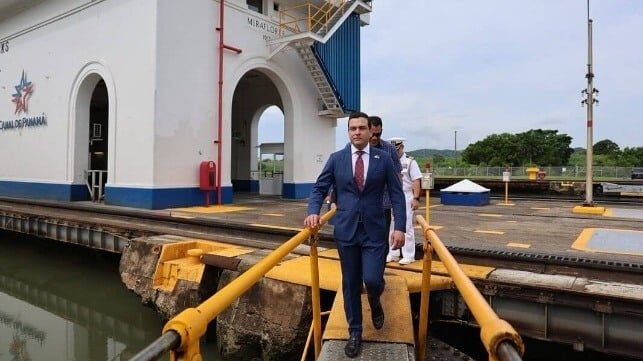The Panama Canal Port Terminal Controversy: China’s Involvement and U.S. Response
The political “tug-of-war” surrounding controls of the port terminals at the Panama Canal and CK Hutchison’s larger portfolio of 41 port operations worldwide continues with China exerting pressure and the U.S. reiterating its position to end the Panama concession. CK Hutchison confirmed last month that talks were ongoing and that a Chinese company would be invited into the discussions after the lockup period on the original deals expired in late July.
China’s Cosco, which is already a large port operator, is seeing at least a 20 to 30 percent share of the deal, according to a new report in today’s Financial Times. The paper cites two unnamed sources that said China has only permitted Cosco to enter the talks to maintain its leverage over the deal. China has made it clear that its position is that a Chinese company must be part of the deal to protect Chinese trade interests.
The Financial Times says several options are being discussed, including the possibility that Cosco would participate in the one deal that acquires Hutchison’s 41 global ports outside China and excluding the two terminals in Panama. The original agreement set parallel deals, one for the 41 ports, which is believed to be led by MSC’s Terminal Investments (TiL), while the second deal, led by BlackRock and with MSC as a minority investor, would acquire the Panama Ports Company, which operates the terminals in Balboa and Cristobal under long-term concessions.
U.S. Response and Ambassador’s Statement
Donald Trump had hailed the deal in March, saying it was returning the Panama Canal to the United States. A friend of the CEO of BlackRock, Larry Fink, Trump said the American company was acquiring many ports. Since then, the U.S. has remained largely quiet on its views of the deal.
U.S. Ambassador to Panama Kevin Marino Cabrera, on Wednesday, August 6, however, spoke out against CK Hutchison. He supported the legal actions taken by Panama’s Comptroller General to void the concession. He said that the U.S. was “excited” that Hutchison would soon be no longer operating the ports in Panama.
“Our position is that they are a bad operator; they haven’t done a good job,” Cabrera told reporters during an event in Colon. “They are a company of the Chinese Communist Party… We are excited that those ports will soon be out of operation, and that good operators willing to contribute to the Panamanian people will come to the country.”
Hutchison’s Defense and Panama Ports Company History
The Panama Ports Company dates to 1997 and was set up with CK Hutchison holding 90 percent, with Panama owning 10 percent. The company’s concession was renewed for an additional 25 years in 2021 in what is now a contested process.
Cabrera asserted that the Panama Ports Company (PPC) has not honored its agreements and owes Panama money. He also linked the company to the Communist government, although Hutchison is based in Hong Kong. Founder, Li Ka-shing, a Hong Kong billionaire, has frequently been at odds with the Chinese government, and this year it accused him of being disloyal and not acting in the interest of the state after the deals were announced to sell the port terminals.
Hutchison has defended its operations in Panama, saying the company has followed all the legal requirements. It asserts that it has contributed to the Panama economy. The company said in a statement in April that PPC has made significant investments that exceed $1,695 million, surpassing not only the $50 million investment required under the original concession contract, but also the $1,000 million agreed under the addendum, as confirmed by the Comptroller General of Panama.
Industry Response and Conclusion
The shipping industry continues to watch the developments as well. CMA CGM confirmed that it would be interested in some of the assets, and Maersk said it is also watching the deal closely. The Financial Times says none of the shipping companies have been invited into the negotiations, and it notes any bidder would need to involve the Chinese to win approval for an acquisition.
In conclusion, the ongoing saga surrounding the Panama Canal port terminals and CK Hutchison’s global port operations highlights the complex interplay between political interests, economic considerations, and international trade dynamics. As China asserts its influence and the U.S. stands firm in its position, the future of these strategic port assets remains uncertain, with implications for global maritime commerce and geopolitical relations.

